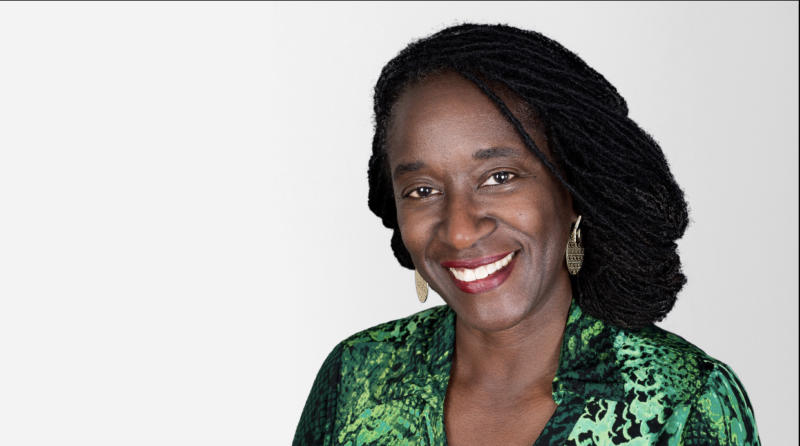Dr. Jacqueline Bouvier Copeland is committed to fighting for social justice and the advancement of women in tech.
Dr. Jacqueline Bouvier Copeland is a pioneer in a new facet of the human rights movement — the tech industry. Serving as the chief operating officer of AnitaB.org, Dr. Copeland believes she is fulfilling her true purpose in life by advocating for the advancement of women in technology. Promoting equity and social justice are foundational principles in her distinguished career.
“I really do see technology, diversity, and access as the new human rights issue in a digital, global economy where technology is changing every day,” said Dr. Copeland.
Dr. Copeland has a multifaceted professional background, with roles as varied as a cultural anthropologist, urban designer, and award-winning global social impact executive. In her current role with AnitaB.org, she works with the CEO to design the nonprofit’s strategic goals and operational processes so that they align to promote and fulfill its mission of equity and advancement for women in technology.
Channeling her passion for social justice into the work she does at AnitaB.org is crucial to Dr. Copeland, as she is eager to help guide the advancement of women technologists and their careers through her work with the organization. As the world becomes increasingly automated, Dr. Copeland thinks all people need to have technology access to survive and thrive. That is why she and everyone at AnitaB.org are working diligently to achieve the organization’s moonshot — to achieve 50/50 gender equity in the technology industry for all women by 2025.
“I think through the AnitaB.org experience, I am furthering my craft, working across the world to advance diversity for social good at multiple levels along with other people who are leading social efforts,” said Dr. Copeland. “With those who need more access and opportunity in a changing world and also defining just what diversity means in a global context.”
Over the past year, Dr. Copeland has been able to apply her creative approach to increasing diversity in tech, acknowledging that she feels like she has done six years’ worth of work in the last twelve months.
“It is exhilarating,” said Dr. Copeland. “I think that I’ll be able to add more to the art and science of social change, with the work I do creating, training, and documenting new approaches to spread justice across the world with technology as a result of my AnitaB.org experience.”
The organization’s namesake — Anita Borg — founded the nonprofit with a mission to influence women to embrace the burgeoning field of technology. Formerly named the Institute for Women and Technology, it was founded with the desire to highlight the impact of technology on women and have women in turn influence the world by taking on careers and interest in the technology sector. Dr. Copeland believes it is more important than ever to have an organization such as AnitaB.org that supports women in technological roles.
“What I love about that is [Borg] didn’t have to do it,” said Dr. Copeland. “She was doing fine in her career in terms of her individual success. Yet, she recognized [that] there was something wrong and she not only stood up, she gave voice to it, and created an organization that is still going strong 20 years later.”
Borg spoke about wanting a way to increase the representation of women and underrepresented minorities in technological roles as well as create a place where women could safely connect to fellow female technologists. Her vision was made manifest through the creation of Systers in 1987 — the first online community for women in tech — and continued to grow and expand into the establishment of the Institute for Women and Technology ten years later. Borg’s vision remains clear today as AnitaB.org works to increase the influence women have on all aspects of technology, and to amplify the positive impact of technology on the world’s women. As a result of Borg’s fearless work and dedication to empowering women, the organization supports women in technology in more than 50 countries to help them learn, grow, and develop as technologists.
Dr. Copeland shares in the founder’s vision of a more equitable tech landscape and acknowledges that although Borg wasn’t a person of color, she committed her life’s work to advancing the success of all people, including the most underrepresented. Borg understood that her success was inextricably linked to the freedom and success of other people.
“I might not be defined as we do today as ‘intersectionality’, but [Borg] understood that implicitly,” said Dr. Copeland. “So, I think that the origin story is a really powerful example and inspiration for me. Our work and this institution are about social impact, and it’s so important.”
Working as a black woman in technology, Dr. Copeland admits she has had to navigate through many stereotypes while maintaining her confidence. She has learned to be true to who she is, which she hopes inspires other people to be proud of who they are — no matter their ethnic background or heritage. Dr. Copeland also stresses the need for companies and leaders to understand that every human being, regardless of their gender or race, should be given the opportunity to express their potential without impediment.
“Advocating for myself and maintaining my career has been, let’s say, a work in progress, and there are many women facing these kinds of issues,” shared Dr. Copeland. “Women represent the diversity of the world, so it’s not just that you’re a woman, you might be LGBTQ … or you might be a woman from a rural community. Humanity is defined by all kinds of diversity. And companies need to allow people to be who they are so that they can have the full benefit of diversity.”
Do your research and learn about the history of women in technology. This is the advice Dr. Copeland offers to women who want to pursue a career in tech or follow in her footsteps. She also believes that women can achieve their dreams, if they first and foremost believe in themselves. Companies and the world benefit when there is true equity of opportunity for women and all people in technology. In the tradition of our founder, our mission is to ensure that technology mirrors the communities it serves.
“I do think a lot of career trajectories start with a dream, a vision of ourselves and keeping that alive in the midst of a society that says, well, ‘women are not supposed to be this, or Black people aren’t good at math and science,’” said Dr. Copeland. “There are so many unnecessary barriers that society creates, that inhibit our development and opportunity,” she added.
Dr. Copeland believes we should dismantle the prevailing societal narrative that women don’t have as much potential as men.
“There’s so much happening in the world right now that we know is unjust and finding the courage with others to seek truth and speak truth to power is really important,” said Dr. Copeland. “For any one person to achieve their potential, it requires us all to have the opportunity to achieve our potential because we’re all interconnected. I would encourage any woman or person, who is on the tech, or any career track, to remember a job is an opportunity to serve others.”
She believes that people should consider their career and their professional opportunities as a way to serve a larger purpose and help people. Dr. Copeland thinks sometimes leaders can suffer from tunnel vision and not really recognize the power that they have in influencing others. In her opinion, it is our civic and social responsibility to pay our opportunities forward and remain humble as we create impact.
“It’s very important that we get organized to create a pathway for women and underrepresented groups into the future of tech,” Dr. Copeland said. “And we look forward to working with Blavity and AfroTech and all the very diverse organizations that are creating new opportunities for all people in the world of technology.”


